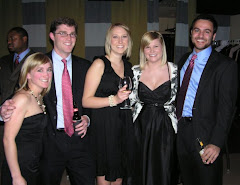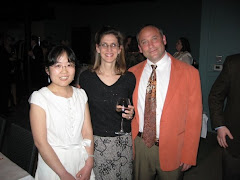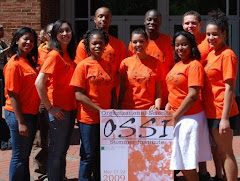Thursday, August 20, 2009
Time Flies When You’re Working Hard: Rising Second-Year Students Reflect on Progress
by Ashley Andrew
 In the academic world, the month of August is a stepping stone of sorts. And while incoming students are getting ready to take their first steps on their Organizational Science doctoral program journeys, the rising second-year students—comprising—David Askay, Daniel Bonilla, Kate Frear, Tonya Frevert, Samantha Paustian-Underdahl and Izabela Szymanska—are eagerly joining the ranks of the more-seasoned doctoral students. Paustian-Underdahl summed up the general feeling, “While it was a lot of work, now that it’s over, I feel like it flew by.”
In the academic world, the month of August is a stepping stone of sorts. And while incoming students are getting ready to take their first steps on their Organizational Science doctoral program journeys, the rising second-year students—comprising—David Askay, Daniel Bonilla, Kate Frear, Tonya Frevert, Samantha Paustian-Underdahl and Izabela Szymanska—are eagerly joining the ranks of the more-seasoned doctoral students. Paustian-Underdahl summed up the general feeling, “While it was a lot of work, now that it’s over, I feel like it flew by.”Though everyone agreed that the workload was much more demanding than they had anticipated, the group seemed to look back gratefully. “I feel a lot more confident after getting through the first year,” said Bonilla. “I was convinced in the fall that they made a selection mistake by letting me in.” That imposter syndrome, however, seemed to fade for the group as they found their footing in the program. “I realize that a lot of knowledge stayed with me and now I feel more confident that I have all of that knowledge to draw upon,” Szymanska said.
This class is one of the most diverse to date in terms of both
 geography and research interests. Hailing from Illinois, Tennessee, Georgia, Michigan, California and even Poland, this cohort comes from range of undergraduate and graduate backgrounds including cognitive psychology, sociology, management, and psychology. Still, sitting down with them, it’s clear they have formed quite a bond throughout the year and remain supportive of one another. They even have their own cohort nickname (which they can’t reveal) and often socialize with one another outside of school.
geography and research interests. Hailing from Illinois, Tennessee, Georgia, Michigan, California and even Poland, this cohort comes from range of undergraduate and graduate backgrounds including cognitive psychology, sociology, management, and psychology. Still, sitting down with them, it’s clear they have formed quite a bond throughout the year and remain supportive of one another. They even have their own cohort nickname (which they can’t reveal) and often socialize with one another outside of school.  One of their favorite memories as a group was planning the entertainment for the Organizational Science banquet in February 2009, where they put on a skit for fellow students and faculty members. They also enjoyed cooking Chinese food together and attending various conferences. “The SIOP [Society for Industrial and Organizational Psychology] and ICA [International Communication Association] conferences were fun because it was great to see a different side of the academic world,” said Paustian-Underdahl.
One of their favorite memories as a group was planning the entertainment for the Organizational Science banquet in February 2009, where they put on a skit for fellow students and faculty members. They also enjoyed cooking Chinese food together and attending various conferences. “The SIOP [Society for Industrial and Organizational Psychology] and ICA [International Communication Association] conferences were fun because it was great to see a different side of the academic world,” said Paustian-Underdahl.
Coming from out of state, the students seemed to  find the transition to Charlotte relatively easy. As Frevert pointed out, “It’s a nice diverse city with lots of different things to do.” All of them lived in Charlotte’s University City area during their first years, given its close proximity to campus—making it convenient for long days and late nights at school. On the weekends they enjoyed hanging out in the North Davidson “NODA” arts district of Charlotte and participating in the bi-weekly gallery crawl for cheap and convenient fun.
find the transition to Charlotte relatively easy. As Frevert pointed out, “It’s a nice diverse city with lots of different things to do.” All of them lived in Charlotte’s University City area during their first years, given its close proximity to campus—making it convenient for long days and late nights at school. On the weekends they enjoyed hanging out in the North Davidson “NODA” arts district of Charlotte and participating in the bi-weekly gallery crawl for cheap and convenient fun.
In addition to the extra workload and a new city, they encountered a few other surprises along the way. “I didn’t realize how ‘green’ I was and how much I had to learn about the other disciplines,” said Frevert. Paustian-Underdahl added that she was surprised to learn how difficult the publication process can be. “After we came to the end of the semester, I was surprised to know that survival was possible,” Szymanska joked.
 The students also commented that the support given by senior students and faculty members was a pleasant surprise. Bonilla said that it was nice to know that you could go to other students with questions and concerns while Frevert pointed out that she did not feel she was in a “cut-throat” program and enjoyed having the freedom and self-direction to choose her own projects.
The students also commented that the support given by senior students and faculty members was a pleasant surprise. Bonilla said that it was nice to know that you could go to other students with questions and concerns while Frevert pointed out that she did not feel she was in a “cut-throat” program and enjoyed having the freedom and self-direction to choose her own projects.
Although their first years are behind them, this cohort has no intention of slowing down and continues to set high goals. Fulfilling requirements in master’s-degree programs (in which they are co-enrolled), working on publishing research, and becoming experts in their fields are some of the future endeavors for which this class is gearing up.
Ready to pass the torch, the group leaves the incoming class with the following advice:
- Relax
- Get enough sleep
- Take vitamins
- Schedule your time
- Don’t be afraid to ask questions
- Use your built-in support network
- Take some time out to live your life
- Remember that even if you think the world is going to collapse, you will live to see another day
For the rising second-year cohort, it seems, the first year was about adjusting to the rigors of doctoral education while attempting to maintain a sense of balance. And with those lessons in mind, they’ll begin their second years with an augmented sense of purpose, guided by the past but with open minds toward both future challenges and opportunities. If their first years were any indication of the future, however, time will continue to seem like it’s flying as they progress even further toward scholarly excellence.











No comments:
Post a Comment